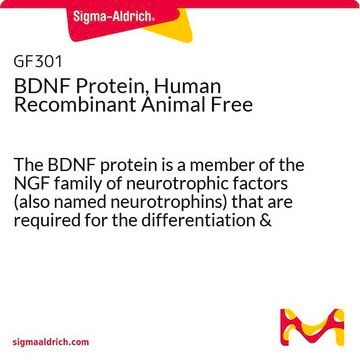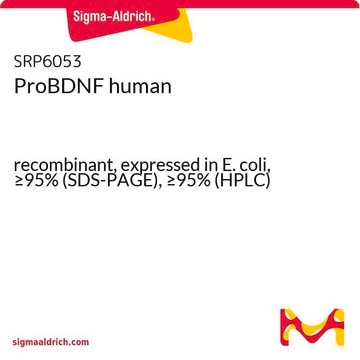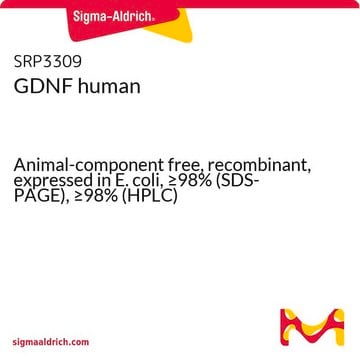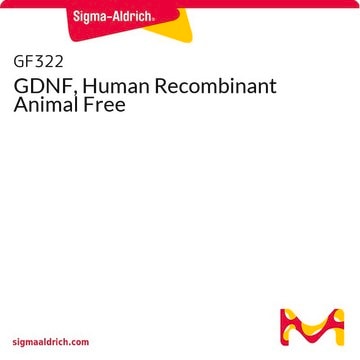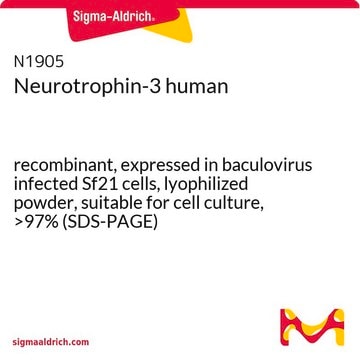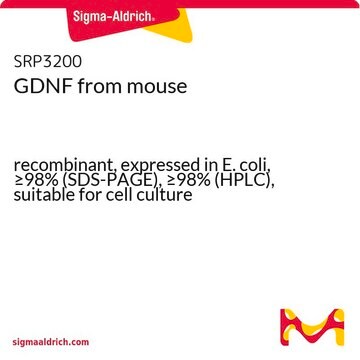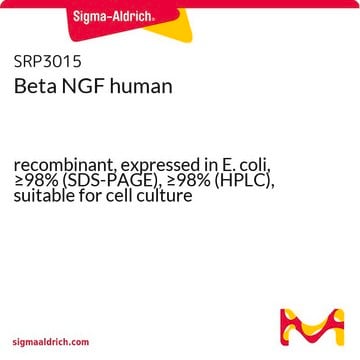SRP3014
BDNF human
Carrier free, recombinant, expressed in E. coli, ≥95% (SDS-PAGE), suitable for cell culture
Synonym(s):
Brain Derived Neurotrophic Factor
Sign Into View Organizational & Contract Pricing
All Photos(3)
About This Item
UNSPSC Code:
12352202
NACRES:
NA.32
Recommended Products
biological source
human
Quality Level
recombinant
expressed in E. coli
Assay
≥95% (SDS-PAGE)
form
lyophilized
mol wt
27.0 kDa
packaging
pkg of 10 μg
technique(s)
cell culture | mammalian: suitable
impurities
≤1.00 EU/μg endotoxin, tested
UniProt accession no.
shipped in
wet ice
storage temp.
−20°C
Gene Information
human ... BDNF(627)
General description
The gene BDNF (brain derived neurotrophic factor) is mapped to human chromosome 11p14.1. BDNF is a member of the neurotrophin family of growth factors. The gene encodes a precursor protein, proBDNF. Mature BDNF (mBDNF) is synthesized by post-translational cleavage of proBDNF. Both proBDNF and mBDNF play crucial roles in cellular signaling. BDNF is expressed as the C-terminal portion of a 247 amino acid polypeptide precursor, which also contains a signal sequence of 18 amino acid residue and a propeptide of 110 amino acid residues. Recombinant human BDNF is a 27.0kDa homodimer of two 119 amino acid subunits linked by strong noncovalent interactions.
Biochem/physiol Actions
Like other members of this family, BDNF (brain derived neurotrophic factor) supports neuron proliferation and survival. BDNF can bind to a low affinity cell surface receptor called LNGFR (low-affinity nerve growth factor receptor), which also binds other neurotrophins such as NGF (nerve growth factor), NT-3 (neurotrophin-3) and NT-4. However, BDNF mediates its neurotrophic properties by signaling through a high affinity cell surface receptor called gp145/trkB (tropomyosin-related kinase B). BDNF also plays an important role in vascular function and participates in angiogenesis. It is involved in the pathogenesis of Alzheimer′s disease. ProBDNF interacts with p75 neurotrophin receptor, leading to long-term depression in the hippocampus.
Sequence
MHSDPARRGE LSVCDSISEW VTAADKKTAV DMSGGTVTVL EKVPVSKGQL KQYFYETKCN PMGYTKEGCR GIDKRHWNSQ CRTTQSYVRA LTMDSKKRIG WRFIRIDTSC VCTLTIKRGR
Physical form
Lyophilized with no additives.
Reconstitution
Centrifuge the vial prior to opening. Reconstitute in water to a concentration of 0.1-1.0 mg/ml. Do not vortex. This solution can be stored at 2-8°C for up to 1 week. For extended storage, it is recommended to further dilute in a buffer containing a stabilizer (example 5% Trehalose) and store in working aliquots at -20°C to -80°C.
Analysis Note
The biological activity is determined by its ability to stimulate the proliferation of human neuroblastoma cells, SH-SY5Y.
Storage Class Code
11 - Combustible Solids
WGK
WGK 3
Flash Point(F)
Not applicable
Flash Point(C)
Not applicable
Certificates of Analysis (COA)
Search for Certificates of Analysis (COA) by entering the products Lot/Batch Number. Lot and Batch Numbers can be found on a product’s label following the words ‘Lot’ or ‘Batch’.
Already Own This Product?
Find documentation for the products that you have recently purchased in the Document Library.
Customers Also Viewed
Function and evolution in the NGF family and its receptors.
Journal of Neuroscience Research, 32, 461-470 (1992)
Nia M Harris et al.
Pharmacology, biochemistry, and behavior, 150-151, 48-56 (2016-10-26)
Low levels of brain-derived neurotrophic factor (BDNF) are linked to delayed neurological recovery, depression, and cognitive impairment following stroke. Supplementation with BDNF reverses these effects. Unfortunately, systemically administered BDNF in its native form has minimal therapeutic value due to its
Cherian K Kandathil et al.
Hearing research, 342, 134-143 (2016-10-25)
Many previous studies have shown significant neurotrophic effects of intracochlear delivery of BDNF in preventing degeneration of cochlear spiral ganglion (SG) neurons after deafness in rodents and our laboratory has shown similar results in developing cats deafened prior to hearing
Elisabetta Palazzo et al.
International journal of molecular sciences, 20(14) (2019-07-25)
Well-regulated epidermal homeostasis depends on the function of different classes of factors, such as transcription regulators and receptors. Alterations in this homeostatic balance may lead to the development of cutaneous squamous tumorigenesis. The homeobox transcription factor DLX3 is determinant for
Erin E Helm et al.
Experimental brain research, 234(2), 341-351 (2015-10-22)
Induction of neural plasticity through motor learning has been demonstrated in animals and humans. Brain-derived neurotrophic factor (BDNF), a member of the neurotrophin family of growth factors, is thought to play an integral role in modulation of central nervous system
Our team of scientists has experience in all areas of research including Life Science, Material Science, Chemical Synthesis, Chromatography, Analytical and many others.
Contact Technical Service




